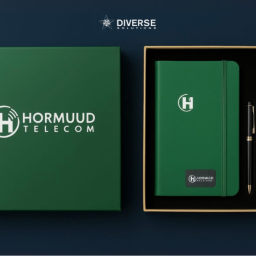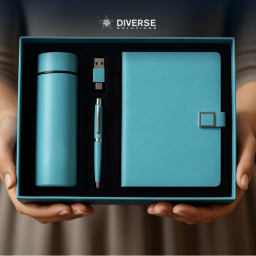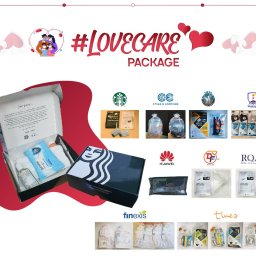
Corporate gifting isn’t just about handing out freebies or swag.
It’s a powerful tool in the business world that helps foster relationships, build brand loyalty, and enhance employee engagement.
But have you ever wondered about the psychology behind it?
Why does giving a gift create such a strong connection, and how can companies make the most of this practice?
Let’s dive deep into the psychology behind corporate gifting and explore why it works, how to do it right, and what to watch out for.
Why Companies Engage in Corporate Gifting
Companies engage in corporate gifting for a variety of reasons.
Here are some of the most common motivations:
Building relationships
Corporate gifts are a powerful way to show appreciation and nurture relationships with clients, employees, and business partners.
A well-chosen gift can create a bond between the giver and the receiver, fostering mutual respect and trust.
Enhancing brand loyalty
When clients receive thoughtful gifts, they feel valued and appreciated, which can increase their loyalty to the brand.
Research shows that people are more likely to stay loyal to a brand that makes them feel special and recognized.
Increasing employee engagement
Corporate gifting isn’t just for clients; it’s also a great way to recognize employees.
When employees feel appreciated through thoughtful gifts, their morale improves, and they become more engaged at work.
This boost in engagement often leads to higher productivity and motivation.
Marketing and promotion
Corporate gifts can double as marketing tools.
Branded items not only increase brand visibility but also serve as a constant reminder of the company every time the gift is used.
This subtle form of promotion can help keep the company top-of-mind for clients and partners alike.

Psychological Principles at Play
Several psychological principles explain why corporate gifting is such an effective strategy.
Understanding these principles can help companies choose the right gifts and approach for their audience.
Reciprocity
One of the most powerful principles in psychology is the rule of reciprocity.
When someone gives us a gift, we feel compelled to return the favor.
This creates a sense of obligation and can lead to stronger business relationships. In fact, a study from the Journal of Consumer Psychology found that people are more likely to reciprocate when they receive unexpected gifts.
Social proof
People tend to follow the actions of others, especially when they are uncertain.
When clients or employees see others receiving gifts from a company, it creates a perception that the company values its relationships, encouraging others to engage more deeply with the brand.
Emotional connection
Gifts can create an emotional connection between the giver and the receiver.
This is particularly important in business, where relationships are key.
A well-chosen gift can evoke positive emotions, making the recipient more likely to remember the giver favorably.
Cognitive dissonance
When a company gives a gift, it can create a sense of cognitive dissonance in the recipient—especially if they haven’t done anything to deserve it.
This discomfort can lead the recipient to change their attitudes or behaviors to align with the gift, potentially resulting in more favorable actions toward the company.
The Role of Personalization
Personalization plays a crucial role in the effectiveness of corporate gifts. A generic gift may be appreciated, but a personalized gift can have a much greater impact.
Here’s why:
Shows thoughtfulness
A personalized gift shows that the company has put thought into the gift, considering the recipient’s preferences, interests, and needs.
This makes the gift more meaningful and memorable.
Creates a unique experience
A personalized gift creates a special experience for the recipient, making them feel valued and unique.
This can deepen the emotional connection between the giver and the receiver, strengthening the relationship in a way that a generic gift might not.
Increases perceived value
Even if the gift itself isn’t expensive, personalization can make it feel more valuable.
People tend to see personalized gifts as one-of-a-kind, which enhances their perceived worth. This added value makes the recipient appreciate the gift even more.

Ethical Considerations in Corporate Gifting
While corporate gifting can be a powerful tool, it’s important to consider the ethical implications.
Here are some ethical considerations to keep in mind:
Avoiding conflicts of interest
Gifts should never be used to sway decisions or create conflicts of interest.
It’s crucial that gifts are given with genuine intentions, not as a way to manipulate or pressure the recipient into making certain choices.
Transparency
Be clear about the purpose of the gift.
If it’s meant as a token of appreciation, make that known to avoid any misunderstandings.
Transparency helps ensure that the gesture is seen for what it is—a simple, thoughtful act.
Cultural sensitivity
When giving gifts, it’s essential to consider cultural differences.
What might be an appropriate gift in one culture could be seen differently in another.
Being culturally sensitive shows respect and prevents any unintended offense.
Company policies
Always follow your company’s guidelines regarding corporate gifts.
Many organizations have specific rules to avoid any appearance of impropriety or favoritism.
Sticking to these policies helps maintain trust and professionalism.
Strategic Approaches to Corporate Gifting
To make the most of corporate gifting, it’s important to have a strategic approach.
Here are some tips to consider:
Know your audience
Understanding who you’re giving the gift to is crucial. Take the time to learn about the preferences and interests of your clients, employees, or business partners.
You could even gather feedback or conduct surveys to find out what they would truly appreciate.
Set clear objectives
Before selecting a gift, think about what you want to achieve.
Are you aiming to strengthen relationships, boost loyalty, or increase employee morale?
Defining your goals will guide your gift choices and help you assess their impact.
Timing matters
The timing of your gift can make a big difference in how it’s received.
Consider giving gifts at meaningful moments, like during the holidays, on anniversaries, or after completing a successful project.
Well-timed gifts are more likely to leave a lasting impression.
Quality over quantity
When it comes to corporate gifts, it’s better to choose one high-quality item than to give out lots of generic ones.
A carefully selected, quality gift will make a stronger impact and be remembered longer.

Final Thoughts
Corporate gifting is more than just a nice gesture—it’s a strategic tool that can enhance relationships, build brand loyalty, and boost employee engagement.
By understanding the psychology behind gifting and taking a thoughtful, personalized approach, companies can create meaningful connections that have a lasting impact.
















